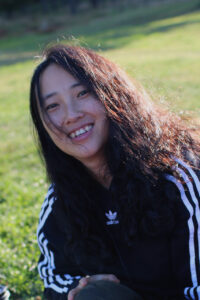Asian Heritage in Horror: Interview with Yi Izzy Yu

 In 2011, Yi Izzy Yu left Northern China for the US. Since then, she has taught Chinese and English in high schools and colleges, given birth to the now eight-year-old visual artist Frankie Lu Branscum, and published work in magazines ranging from New England Review to Samovar and in the collections of translated Chinese weird fiction: The Shadow Book of Ji Yun and Zhiguai. Currently, she lives outside of Pittsburgh, where she teaches and translates Chinese and investigates shadows.
In 2011, Yi Izzy Yu left Northern China for the US. Since then, she has taught Chinese and English in high schools and colleges, given birth to the now eight-year-old visual artist Frankie Lu Branscum, and published work in magazines ranging from New England Review to Samovar and in the collections of translated Chinese weird fiction: The Shadow Book of Ji Yun and Zhiguai. Currently, she lives outside of Pittsburgh, where she teaches and translates Chinese and investigates shadows.
What inspired you to start writing?
I love language. Always have. At the end of my undergraduate studies in China, for example, I spent six months in the library writing down beautiful lines from poems and assembled them into a 93-page handwritten book as a graduation present for my friend. Stories have always seemed miraculous to me, too. That symbols etched or inked on paper or communicated through sound can catapult you into alternate realities and selves so deeply that you forget your current life is metaphysical magic.
What was it about the horror genre that drew you to it?
Horror is such a powerful primal genre. It’s bloody and bodied, toothed and occult, slick with sweat, savagely honest, throbbing, flapping and alive. I swear I can feel it crackle and pulsate with ancient energies—rooted in myth and in cave stories about predators that lurk in the dark. I like too how close horror, at least some of it, is to dreams. Via weird atmospheres, its problem-solving rehearsal of dangers, its deep-diving into anxieties and fears that we don’t ordinarily admit, and its forays into the symbol-studded terrain of depth psychology. This makes it an exciting genre to me aesthetically and intellectually. Add to all this that I come from China, which to this day is a heavily shamanic culture. Horror is very friendly to such a culture.
Do you make a conscious effort to include Asian Diaspora characters and themes in your writing and if so, what do you want to portray?
I’m an immigrant, as are many of my friends, and I teach language and ESL. My everyday communities therefore naturally include many diasporic peoples, and they organically find their way into my work. This makes me happy since it’s important to me that my family and my friends see themselves portrayed in literature. Even if that wasn’t the case, I’d still be drawn to diasporic characters because they have such incredibly powerful stories—stories that cut to the heart of what it means to have a home or to be, stories that powerfully reflect on reinvention, otherness, sacrifice, cultural conflict, and otherness. Every diasporic story is the hero’s journey writ large and moreover every human being is diasporic in one way or another; in ways geographical, cultural, or spiritual.
What has writing horror taught you about the world and yourself?
So much. Writing horror continually teaches me that trauma and fear and apocalypse can be opportunities for growth and new beginnings. It teaches me how nobility and monstrosity comingle inside us and the strange ways that we are all interconnected, as are the moments and stage props of our lives.
And writing in general for me is a kind of spiritual practice. It challenges you to be the smartest version of yourself, the most compassionate, the most brutally and vulnerably honest. It reminds you to look more closely at the colors and shapes of the world, to memorize the names of trees and shades of pink, to name your fears and hopes, and to distinguish between the different flavors of heartbreak and courage.
How have you seen the horror genre change over the years?
I immigrated to the United States from China in 2011. Since then, I’ve been happy to see a dramatically increasing interest in global horror—in written lit, manga, streaming television serials and so on, and horror has become much more culturally diverse in other ways too. I think this is revitalizing the genre in a big way. For example, there’s been a lot of work coming out that blends an awareness of real-life social horrors with supernatural themes, something you see in Jayro Bustamante’s La Llorona, Giddens Ko’s Mon Mon Mon Monsters, and Jordan Peele’s brilliant body of work. I think horror comics have taken a big step up too. There’s some amazing work coming out. Gideon Falls. Infidel. Something is Killing the Children. Killadelphia.
And how do you think it will continue to evolve?
Horror and creative nonfiction are starting to overlap in interesting ways. And I think horror will push forward too in doing all kinds of philosophical and metaphysical work—the kind of thing you see being done regularly in anime like Mushi-Shi and Ghost Hunt, or in supernatural-themed K-drama. And the effect of global horror—horror from Asian, African, and Latin American traditions, is going to continue to be huge and change things in some pretty big ways. I expect all these trends to overlap and to mix with new concepts coming out of the sciences.
How do you feel the Asian community has been represented thus far in the genre and what hopes do you have for representation in the genre going forward?
The representation has been increasing and diversifying explosively over the last five years or so. And that’s so wonderful to see because as a reader I get all these new amazing works to read and all these new amazing things to think about. That said, there’s certainly a lot of room for growth. I’d like to see more work from Asia translated for a global readership and more work inflected by Asian philosophy and metaphysics. To boot, I’d like to see a wider acknowledgment of the diversity that exists within Asian countries, across Asian countries, and across immigrant, expatriate, hapa, and mixed communities within non-Asian countries. Finally, I would also like to see critical conversations that lean more toward “both/and” Buddhist logic and which draw upon Asian and Asian-inspired perspectives in other ways, rather than being always so indebted to Western literary theory with its valuable but very culture-bound assumptions.
Who are some of your favorite Asian characters in horror?
Right now, I’m seriously obsessed with Nanno in the Thai series Girl from Nowhere. She channels Junji Ito’s Tomie and various K-drama grim reaper figures. She is unsettling and pervy in that way that divinities sometimes are and generally exist outside our classifications of good and evil. She also really shows off the Thai gift for horror-comedy.
I adore Tang Fei’s protagonists too. They tend to be “linglei,” a Chinese phrase that translates to “another kind,” and which refers to eccentric figures with eccentric ways of looking at the world. Such figures disturb you, challenge you, and inspire you all at the same time. Speaking of, I’m a big fan as well of the voices of Yōko Ogawa’s narrators in the collections Diving Pool and Revenge. They’re dreamy and deadpan in a way that I find irresistible and are rendered in prose with lots of space and silence, something you regularly find in East Asian literary and visual art. Ditto the work of Pyun Hye-young.
Who are some Asian Diaspora horror authors you recommend our audience check out?
I think of horror as a continuum, as much about hybrid works and “horror moments’ as about “pure” horror literature. Therefore, many writers who inspire my writing are not horror writers per se but rather their work possesses moments of horror. Here, I’m thinking of names like Ken Liu (“Good Hunting”!), S. Qiouyi Lu, Regina Kanyu Wang, and Lin Yutang.
As far as writers who are known primarily for their horror, I’m blown away by so many writers today. Lee Murray and Angela Yuriko Smith are two of them and moreover, they have brought together many other brilliant names in their must-have anthologies Black Cranes: Tales of Unquiet Women and Tortured Willows: Bent. Bowed. Unbroken. And to name some more names, there’s Nadia Bulkin, Ai Jiang, KP Kulski, Geneve Flynn, Vanessa Fogg, Marjorie Liu, Rena Mason, Christina Sng, Alyssa Wong, Isabel Yap, and so many more.
Off the beaten path, I suggest following the work of literary translators too. Again, Ken Liu and Regina Kanyu Wang are important names, as are Xueting Christine Ni (who translated Tang Fei’s gorgeously bizarre vampire tale “Path to Freedom”) and Jeremy Tiang (who just translated Yan Ge’s Strange Beasts of China which has more than a few moments of horror).
What is one piece of advice you would give horror authors today?
This subconscious is prickly and easily miffed. Don’t disrespect it or take it for granted. It’ll whisper ideas to you. Really good ones. And if you don’t write them down asap and write a bit toward developing them, the subconscious will snatch the ideas back.
Bonus pro tip: you can ask the subconscious story-related questions before you go to sleep and a lot of times you’ll wake up with some fresh ideas or directions to go. In fact, my daughter has picked up the habit of doing this when she’s wondering about something.
And to the Asian writers out there who are just getting started, what advice would you give them?
Let your inner weirdo loose. Draw upon the quirky bodies of expertise, sensitivities, obsessions, affections, annoyances, and odd thoughts that you and you alone possess—especially if you feel shy about doing so. To me, this is a great way to demonstrate the endlessly diverse, unique, intersectional, and hybridized ways there are of being Asian and hapa. Along with this, do your best to resist pressures from communities, constituencies, and publishers who expect you to perform your identity in ways that align more with their vision of who you are or should be than your own messily beautiful, complicated, and irreplaceable life.



